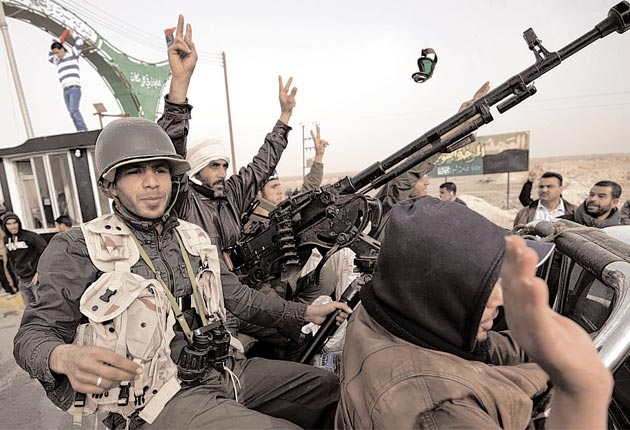Regime forces head for southern oilfields as heavy fighting spreads

Your support helps us to tell the story
From reproductive rights to climate change to Big Tech, The Independent is on the ground when the story is developing. Whether it's investigating the financials of Elon Musk's pro-Trump PAC or producing our latest documentary, 'The A Word', which shines a light on the American women fighting for reproductive rights, we know how important it is to parse out the facts from the messaging.
At such a critical moment in US history, we need reporters on the ground. Your donation allows us to keep sending journalists to speak to both sides of the story.
The Independent is trusted by Americans across the entire political spectrum. And unlike many other quality news outlets, we choose not to lock Americans out of our reporting and analysis with paywalls. We believe quality journalism should be available to everyone, paid for by those who can afford it.
Your support makes all the difference.Rebel forces were closing in on a key strategic city on the road to Muammar Gaddafi's Tripoli stronghold last night after a day of escalating conflict and a ferocious assault on the closest opposition-held city to the capital.
Fighting spread from the coastal strip to the country's interior yesterday when the dictator's forces seized strategic oilfields as both sides sought to break a deadlock after more than two weeks of fighting.
Rebel forces, meanwhile, were on the outskirts of Ras Lanuf, a small oil port, after vowing to march on Tripoli to unseat Gaddafi after 42 years of rule. Mohammed Ibrahimi, a commander of the revolutionary forces, said: "We have almost secured the airport and now we're moving into the city. It has been heavy fighting and we were saved by reinforcements coming in."
Opposition fighters pushed forward after successfully fighting off a regime attack this week on the city of Brega, a major petrochemical centre lying on a strategic route. Meanwhile, regime troops moved south to gain control of strategic oilfields in rebel-controlled eastern territory and offer another route to attack the opposition capital of Benghazi. The regime launched air attacks on the city's airport yesterday.
An arms dump exploded close to Benghazi last night, killing at least 17 people, but it was unclear whether it was attacked, perhaps by saboteurs, or set off by accident. One doctor put the death toll at close to 60 and there weere desperate scenes at the al Jalla Hospital with hundreds of people crowding in to find relatives taken there for treatment. The explosion could be heard at least 15 miles away.
In the west of the country, heavy casualties were reported in Az Zawiya, where forces led by the elite Khamis Brigade, headed by the son of the Libyan leader, pounded the opposition-held city 30 miles west of the capital.In a significant blow to the rebels, their commander in Az Zawiya, Colonel Hussein Darbouk, a Libyan army defector, was reported to have been killed by a shell from anti-aircraft artillery, which both sides have been using as a ground weapon. At one point, the city centre was reported to have fallen into regime hands but opposition fighters claim to have fought back. "We have more than 2,000 driving against the Gaddafi men and, inshallah, we shall prevail, but we know many of us will suffer and many people have already made sacrifices," said Ahmed Tighri, a resistance leader.
Violence erupted in Tripoli with security forces shooting dead six people during demonstrations after Friday prayers. Rallies in the capital last week led to a fierce crackdown by the regime and clashes had reduced in recent days. But in the Tajoura district, long a focal point of discontent, police reacted to marchers chanting "Gaddafi is the enemy of God" and "Tajoura will bury Gaddafi" with tear gas rounds followed by live bullets. Gaddafi loyalists patrolling the streets in cars were also said to have used live ammunition.
Asil Mohammed, a Tajoura resident, said: "We had only been using words but they had replied by using guns ."
Regime forces appear unable to combat rebels in other parts of Libya. There was little attempt to intercept fighters on the road to Ras Lanuf, and air strikes yesterday morning on Brega and nearby Ajdabiya failed to hit ammunition dumps that were the intended targets.
An offer by President Hugo Chavez of Venezuela to mediate for peace was accepted by Gaddafi's government, according to the Libyan Deputy Foreign Minister. Khaled Kaim, despite it being rejected 24 hours earlier. But it was thought unlikely the rebels would agree to let Mr Chavez, a supporter of the Gaddafi regime, act as a middle man.
Libyan television yesterday showed footage of a Dutch navy helicopter crew who were captured trying to evacuate two European oil workers in Sirte, Gaddafi's birthplace and a loyalist stronghold. The crew, two men and a woman, were shown with their Lynx helicopter, rifles, pistols, ammunition, body armour and dollar notes. A caption said: "According to [television channel] al-Arabiya, this helicopter was sent to rescue people, but we can see something else here. This helicopter flew into Libyan airspace without any permission and this is in violation of international law."
Join our commenting forum
Join thought-provoking conversations, follow other Independent readers and see their replies
Comments